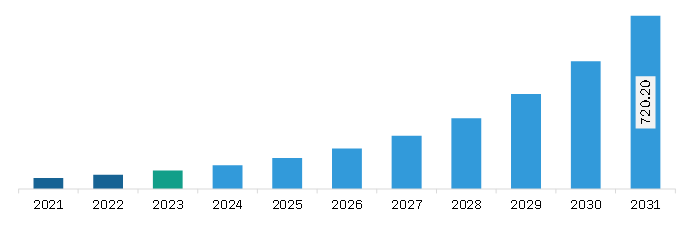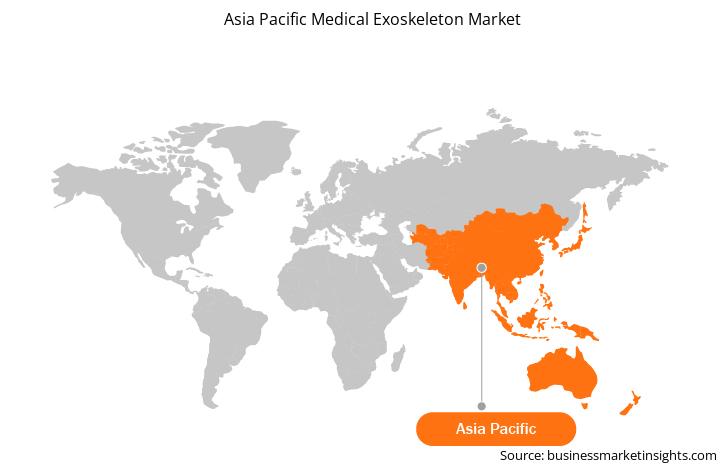The Asia Pacific medical exoskeleton market was valued at US$ 76.43 million in 2023 and is expected to reach US$ 720.20 million by 2031; it is estimated to register a CAGR of 32.4% from 2023 to 2031.
Reduced physical activity and the predominance of seated activities can lead to severe physical and psychological deterioration in people suffering from SCI. Secondary complications related to SCI can also reduce life expectancies. According to the National Library of Medicine, nearly 250,000–500,000 patients suffer from SCIs every year worldwide. An elevated number of cases is attributed to motocross and motorcycling competitions emerging as the most popular sporting activities worldwide, as per the National Institute of Health report. According to the WHO, globally, ~1.19 million people die every year in road crashes, and 20–50 million people suffer non-fatal injuries, with many incurring disabilities. Companies such as Lifeward are focusing on developing exoskeletons that help patients with SCI perform physical activities without pain. For instance, about 20% of the SCI population can be considered candidates for clinical trials of the current ReWalk Personal Exoskeleton or ReWalk Rehabilitation Exoskeleton. Moreover, soft exo-suit devices in medical exoskeletons can be used for patients suffering from SCI. Thus, the increase in the prevalence of SCI and ongoing research for the use of exoskeletons for SCI patients can be expected to fuel the market growth during the forecast period.
The medical exoskeleton market in Asia Pacific is sub segmented into Malaysia, Thailand, India, Singapore, the Philippines, Vietnam, Indonesia, China, Japan, Australia, South Korea, and the Rest of Asia Pacific. Rising geriatric population, increasing chronic disease, growing technological advancements, and surging number of startups are the factors favoring the market progress in this region.

Strategic insights for the Asia Pacific Medical Exoskeleton provides data-driven analysis of the industry landscape, including current trends, key players, and regional nuances. These insights offer actionable recommendations, enabling readers to differentiate themselves from competitors by identifying untapped segments or developing unique value propositions. Leveraging data analytics, these insights help industry players anticipate the market shifts, whether investors, manufacturers, or other stakeholders. A future-oriented perspective is essential, helping stakeholders anticipate market shifts and position themselves for long-term success in this dynamic region. Ultimately, effective strategic insights empower readers to make informed decisions that drive profitability and achieve their business objectives within the market.

| Report Attribute | Details |
|---|---|
| Market size in 2023 | US$ 76.43 Million |
| Market Size by 2031 | US$ 720.20 Million |
| Global CAGR (2023 - 2031) | 32.4% |
| Historical Data | 2020-2021 |
| Forecast period | 2023-2031 |
| Regions and Countries Covered | Asia-Pacific
|
| Market leaders and key company profiles |
The geographic scope of the Asia Pacific Medical Exoskeleton refers to the specific areas in which a business operates and competes. Understanding local distinctions, such as diverse consumer preferences (e.g., demand for specific plug types or battery backup durations), varying economic conditions, and regulatory environments, is crucial for tailoring strategies to specific markets. Businesses can expand their reach by identifying underserved areas or adapting their offerings to meet local demands. A clear market focus allows for more effective resource allocation, targeted marketing campaigns, and better positioning against local competitors, ultimately driving growth in those targeted areas.

The Asia Pacific medical exoskeleton market is categorized into component, type, extremity, application, mobility, end users, and country.
By component, the Asia Pacific medical exoskeleton market is bifurcated into hardware and software. The hardware segment held a larger share of the Asia Pacific medical exoskeleton market share in 2023.
In terms of type, the Asia Pacific medical exoskeleton market is bifurcated into powered exoskeleton and passive exoskeleton. The powered exoskeleton segment held a larger share of the Asia Pacific medical exoskeleton market share in 2023.
Based on extremity, the Asia Pacific medical exoskeleton market is segmented into lower body exoskeleton, upper body exoskeleton, and full body exoskeleton. The lower body exoskeleton segment held the largest share of the Asia Pacific medical exoskeleton market share in 2023.
By application, the Asia Pacific medical exoskeleton market is segmented into spinal cord injury, multiple sclerosis, stroke, cerebral palsy, Parkinson’s Diseases, and others. The spinal cord injury segment held the largest share of the Asia Pacific medical exoskeleton market share in 2023.
In terms of mobility, the Asia Pacific medical exoskeleton market is bifurcated into mobile exoskeleton and stationary exoskeleton. The powered exoskeleton segment held a larger share of the Asia Pacific medical exoskeleton market share in 2023.
By end users, the Asia Pacific medical exoskeleton market is segmented into rehabilitation centers, physiotherapy centers, long term care centers, homecare settings, and others. The rehabilitation centers segment held the largest share of the Asia Pacific medical exoskeleton market share in 2023.
Based on country, the Asia Pacific medical exoskeleton market is segmented into China, Japan, India, South Korea, Australia, and the Rest of Asia Pacific. Japan segment held the largest share of Asia Pacific medical exoskeleton market in 2023.
BIONIK; B-Temia Inc; Cyberdyne Inc; Ekso Bionics Holdings Inc; ExoAtlet; Hocoma AG; Lifeward, Inc; Myomo Inc; and Rex Bionics Ltd. are some of the leading companies operating in the Asia Pacific medical exoskeleton market.
The Asia Pacific Medical Exoskeleton Market is valued at US$ 76.43 Million in 2023, it is projected to reach US$ 720.20 Million by 2031.
As per our report Asia Pacific Medical Exoskeleton Market, the market size is valued at US$ 76.43 Million in 2023, projecting it to reach US$ 720.20 Million by 2031. This translates to a CAGR of approximately 32.4% during the forecast period.
The Asia Pacific Medical Exoskeleton Market report typically cover these key segments-
The historic period, base year, and forecast period can vary slightly depending on the specific market research report. However, for the Asia Pacific Medical Exoskeleton Market report:
The Asia Pacific Medical Exoskeleton Market is populated by several key players, each contributing to its growth and innovation. Some of the major players include:
The Asia Pacific Medical Exoskeleton Market report is valuable for diverse stakeholders, including:
Essentially, anyone involved in or considering involvement in the Asia Pacific Medical Exoskeleton Market value chain can benefit from the information contained in a comprehensive market report.